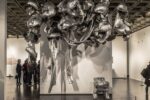Haunted Humanism: Monsters and Mystery in Contemporary Fiction
By Editorial Issue 120
Dwelling contemplatively is hard. The imagination is, for too many, a foreign country. Arguing about is easier than being. Perhaps this is true in the same way that it’s safer and more comfortable to talk about God than risk actual encounter.
Read MoreWatching Movies with Augustine: On Scorsese’s Killers of the Flower Moon
By Editorial Issue 119
When I go to the movies—well, when I go anywhere—Saint Augustine is always nearby. He lives in my head (and heart) rent free.
Read MoreGego’s Hands: Valuing the Body in Art
By Editorial Issue 118
The body that gives poetry. The body that picks up the brush or tackles the clay or sets its hand to write a poem. If, at Image, our imagination is nourished by God incarnate, we are also nourished by a body given.
Read MoreIncident and Significance: A Conversation with Christopher Beha
By Interview Issue 117
My relationship to the novel form is among the most important relationships in my life.
Read MoreEverything Is Material: Yxta Maya Murray and the Cost of Making Art
By Editorial Issue 117
I did not expect a novel about a bisexual Latinx conceptual artist in Los Angeles to hinge on the question of whether art-making is compatible with motherhood. Then I read Yxta Maya Murray’s dazzling Art Is Everything.
Read MoreObliqueness and Extravagance: A Conversation with Rowan Williams and Shane McCrae
By Interview Issue 115
If poetry has nothing else to say, it says this: this world is much more peculiar than you imagine.
Read MoreSomething Other than Devotion: Bored with the Renaissance, Surprised by the Contemporary
By Editorial Issue 115
Unlike a pilgrimage to the Uffizi, Paolini’s installations ask for something other than devotion; his work occasioned in me a kind of wondering that was something other than awe. It invites conversation rather than adulation. The artist is relinquishing control rather than demanding attention.
Read MoreThe Aesthete and the Monk: Against Moralism
By Editorial Issue 114
Can the aesthetic life lead us to God?
Read MoreWhat You See Is You: Rowan Williams and the Art that Surrenders
By Editorial Issue 113
The microcosmic richness of human identity is a reflection of the God who not only made us but sees us, knows us, and speaks to us. Our being addressed by the divine is an infinite well for human possibility.
Read MoreEvading Capture: Art and the Territory of Knowing
By Editorial Issue 112
Artworks can transform our intellectual landscape and reorient the questions we ask, even in the sciences.
Read More









